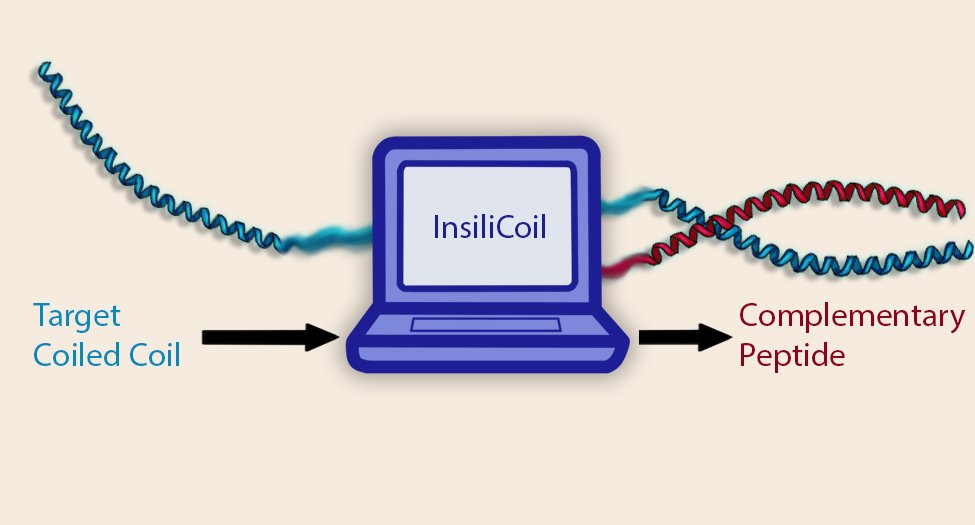
A software platform designed to accelerate coiled coil research by providing high-throughput, user-friendly screening technologies for CC inhibitor design and bioengineering.

It is estimated that 3-5% of all natural proteins form a structure known as the coiled coil (CC). CCs underpin significant biological processes, including signal transduction, DNA replication and gene transcription. Due to CCs involvement in many pathologies e.g. rheumatoid arthritis and various cancers, they make favourable drug targets. They, however, are often deemed undruggable due to a lack of a distinct small-molecule binding pocket. The alternative approach is to target CCs via peptide therapeutics. InsiliCoil rises to the occasion by providing screening tools to assist with designing stable and specific peptides targeting CCs.
Coiled coils (CCs) are characterised by a heptad repeat designated [abcdefg]n. Each heptad position favours specific physiochemical characteristics, for example, the a and d positions favour hydrophobic residues. CCs also feature a strong balance between structual specificity and function, thus making them ideal scaffolds for bioengineering. Previously, de novo designed CCs have been utilised to construct fibres, molecular electronics, nanomolecular structures and other novel biomaterials. InsiliCoil seeks to accelerate de novo design of CCs for bioengineering purposes, providing the screening technologies to assist with designer CC development.
A high-throughput screening engine that simulates the protein-fragment complementation assay to identify CC inhibitors, incorporating the competitive and negative design initiative to improve selectivity. It outputs predicted melting temperatures (Tm), using which it ranks peptides predicted to bind to a user-defined target while discriminating against target and library homodimers, and if desired, against competing off-target interactions. isCAN also features a visualisation engine to produce DrawCoil-style helical wheels, flow diagrams and helical-wheel visualisations highlighting positional variability among successful peptides to inform rational design.
A screening engine designed to identify large sets of orthogonally interacting CCs from user-defined peptide libraries. Orthogonally interacting CCs are determined by predicting melting temperatures (Tm) for each dimer combination and ranking peptides which preferentially dimerise with others whilst discriminating against competing off-targets. Features a visualisation engine to produce Tm heatmaps for predicted interactomes.
Takes a library of peptides an identifies complementary blocks of electrostatic attraction within dimers, increasing intermolecular attraction and intramolecular repulsion. As a result, stabilises dimer formation.
Predicts which peptide from a peptide library contain sequence motifs previously identified to benefit from helix-stabilising modifications based on a literature-derived constraint database.
A tool designed to create peptide libraries by defining residue variability with a template sequence.
A tool to identify positional variability and a consensus sequence from a library of peptides.
Tool to generate singular DrawCoil style helical wheel diagrams for visualisation or publication
Tool to simultaneously generate many DrawCoil style helical wheel diagrams for large-scale visualisation or publication
Tool to visualise residue variability within peptide libraries on a DrawCoil style helical wheel diagram
A tool to calculate the heptad registers of a library of peptides.
Tool to remove FASTA headers from peptide files.
Below you can find downloadable guides to help you get started and understand how to use InsiliCoil, along with installation instructions for Windows and macOS.
Click here if download buttons do not work
Get the latest version of InsiliCoil (v1.3.0). Example data is provided to test and learn the software, following the instructions in the User Guide. Installation instructions and User Guide can be found in the documentation section.
Click here if download buttons do not work
Click here for older versions of InsiliCoil

